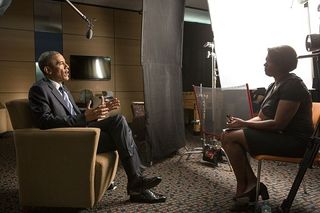Keeping the Promise

On Father’s Day, Discovery Channel and OWN will simultaneously air the documentary Rise: The Promise OfMy Brother’s Keeper, which will explore the lives and families of boys and young men of color from programs derived from the White House-inspired “My Brother’s Keeper” initiative.
I had a chance to speak with Rise producer Dawn Porter about the documentary, which features an poignant interview with President Barack Obama. Porter, who produced the HBO documentary Gideon’s Army, talks about her motivation in making Rise, as well as the documentary's significance and message in light of increased racial tensions in the country. An edited version of the interview appears below.
RTU: What was your inspiration in producing the documentary?
Dawn Porter: I was approached by Discovery to direct the film, and we had a lot of brainstorming about what we wanted to show. My Brother’s Keeper is an umbrella program, so as a director I had a creative challenge: how do you capture the spirit of what’s happening as well as show the variety of what’s happening? Then for me as an African-American woman I’m very interested in social justice and truth, so it was important to me to let people tell their own stories and put them on center stage. So what we settled on was to spend some time with different programs across the country and show a range of approaches, and that’s how we got our main characters. In some ways each program that’s doing positive work for young men of color is a character in the show, but also each of the young adults is a character.
RTU: You were able to able to get President Obama to speak as part of the documentary. How important was his input in the overall message of the special?
DP: From the beginning Discovery had indicated that the President would sit for an interview, but he is the leader of the free world and he has a few things going on in his life. So we really didn’t have that scheduled until we had wrapped the shooting. Then we got the call and they allocated a short time for him, but they said the critical words ‘unless he wants to go longer.’ My guess was that he was really in a frame of mind to talk about the issues that we deal with in the special and the issues that prompted him to launch My Brother’s Keeper in the first place. His vision and his passion for what this is was really central – he spoke so movingly and long about his background and how crucial it is for him to do what he can and to use his office for that purpose. I hope that everybody watching understands the significance of that and having this President sit and talk about this topic.
RTU: Ultimately what do you want to accomplish with this documentary?
DP: I am an African-American woman with two sons aged 13 and 11, and I know the feelings I have when they walk out the door. Strangers don’t know what value my kids are brought up with – they see them and make judgements about them right or wrong. I wanted to let the young people and their families speak so that people can hear that our young men of color are not a problem to be fixed. They are young people who need what all young people need, which is our support, assistance and for us to pay attention to them and to be consistent. So I really wanted to give people an opportunity to hear from them and not to see them face down with handcuffs or having violence perpetrated against them. I wanted people to see them as people having all the struggles that every person that wants to make a good life for themselves have. What was so fantastic about this project was it was not hard to find programs or young people to feature.
RTU: Given what has gone on recently in the country regarding race relations, does it make the special that much more relevant?
DP: No doubt whatsoever. It’s something that we didn’t include [in the special] but I’ll tell you, the President said that when Trayvon Martin was killed it really redoubled his motivation to make sure that before he left office that this was launched and this happened. It feels like every month or every few weeks we’re hearing about another crisis, and I think people are in need of seeing what else is happening that is positive. I know I don’t have any desire to feel hopeless because that’s not acceptable. So I hope that while trying to acknowledge the real challenges everybody faces, we also acknowledge that this is not an impossible social condition, and that some people might need different support based on their individual needs. We can’t just look at an entire group but we need to look at people individually. Also,I would love to see other directors and other producers bring their take to this – there are lots of voices that we should be hearing to show that this is what normal really is.
Multichannel Newsletter
The smarter way to stay on top of the multichannel video marketplace. Sign up below.
R. Thomas Umstead serves as senior content producer, programming for Multichannel News, Broadcasting + Cable and Next TV. During his more than 30-year career as a print and online journalist, Umstead has written articles on a variety of subjects ranging from TV technology, marketing and sports production to content distribution and development. He has provided expert commentary on television issues and trends for such TV, print, radio and streaming outlets as Fox News, CNBC, the Today show, USA Today, The New York Times and National Public Radio. Umstead has also filmed, produced and edited more than 100 original video interviews, profiles and news reports featuring key cable television executives as well as entertainers and celebrity personalities.

